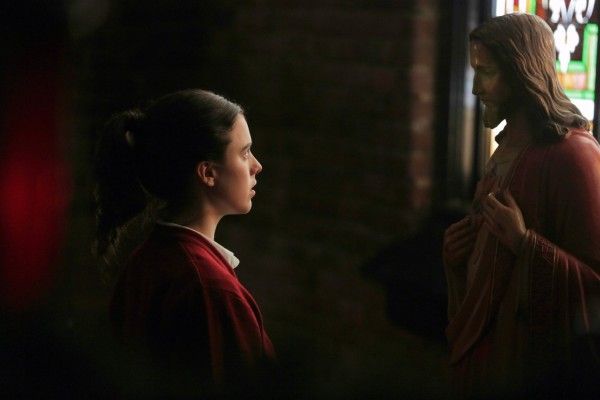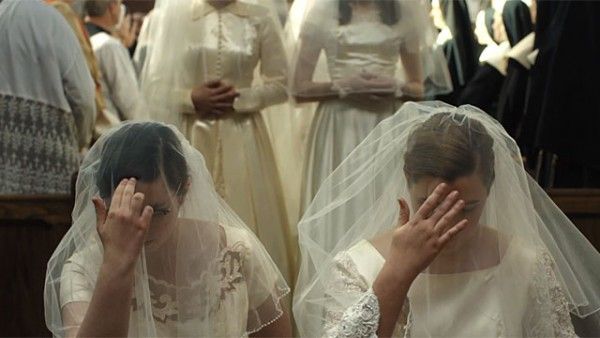At the tail end of the 1960s, in the wake of the Catholic Church’s Vatican II reforms to transform the church into a more progressive global entity, thousands of nuns left behind their habits and their orders. This time in history serves as the backdrop for Margaret Betts’ narrative film debut Novitiate: a stern on the surface, yet entirely human look at religion, femininity and faith.
But while the film is structured around a specific time in history, its narrative interests are less localized. The first branch of which (and by far the most uniquely pitched) is the religious journey of Sister Cathleen (Margaret Qualley), who leaves behind a broken family and an agnostic mother just after high school in order to retreat to a nearby nunnery. Wide-eyed and lit to evoke the holiness of the Virgin Mary as much as the glamour of Natalie Wood, Cathleen is absolutely besotted not with religion, but with god himself. On more than one occasion, Cathleen’s holy exclamations of devotion grow into something that suggests a far more carnal kind of relationship, an interesting, provocative theme that helps distinguish Novitiate from other films of its ilk.
Complicating Cathleen’s story is Sister Mary Grace (Dianna Agron), a young and beautiful nun whose harsh Catholic education failed to harden with her heart. She’s kind – if resigned – to the young potential nuns she’s been tasked with teaching, but her dedication to the church wavers. Quickly, Grace becomes emblematic of the inner conflicts of these young postulants. In one of her very first scenes, we watch Grace disrobe from her habit, as Betts attempts to connect her outward religious being to the young woman seeking silent sexual pleasure within her bare living quarters.
Then, there’s Mother Superior, a ferocious Melissa Leo whose structured habit and cloudy eyes imply decades of self-sacrifice, poverty and quietly brewing anger. “You’ll be spending the next six months as postulants. Any questions?” she prompts a young crew of habit hopefuls – including Sister Cathleen – early on in the film. When a hand is raised, she snaps: “Put your hands down sister, postulants have no questions. And you are free to go home.” She’s domineering and cruel to the point of sadism, encouraging rain-soaked crawls along the church grounds and public humiliation as ways to test the young students’ devotion to god. But she’s got her own trial: she’s got no choice but to implement the earth-shattering new policies in Vatican II, which not only threaten her power as Mother Superior, but threaten to splinter the community she’s devoted her entire life to.
For all the unique POVs in Novitiate, it’s impossible to herald the Margaret Betts’ directorial debut as one thing or another. It is, for better or worse, many films at once. It’s an evocative tribute to the solemnity of Black Narcissus, a refreshingly non-judgmental interrogation of religion, and a sexually charged chamber piece. Each are unique threads in their own right, but by playing at multiple narratives, Betts fails to totally satisfy any of them. And at a solid two hours, Novitiate will likely test the patience of even trained art-house viewers.
Still, it’s a gorgeous affair, and viewers can count on being bowled over by Betts’ sense of composition. In Novitiate, she displays an uncanny, Campion-esque ability to create iconography in moving image. In one particularly evocative scene, after the postulants are allowed to progress to their next rung of training, the young women don wedding dresses and rush outside in cream, lace and silk to dance around a roaring fire. “I love you god,” they scream to the heavens. Shots of rosaries and smashed mirrors become still lifes in the hands of Betts and cinematographer Kat Westergaard, providing some style amidst the substance.
It’s hard to fault Betts for aiming so high in Novitiate as she asks probing, provocative questions of a religious society so long characterized by secrecy. What does it mean for a woman to truly love god with her body and soul? What are the implications of devoting your life to an unseen force that can never reciprocate? Does devotion mean anything if no one is watching? By the film’s close, it becomes clear that Novitiate doesn’t know the answers to any of these existential queries, but Betts seems happy to let those questions linger. If you can stand the silence, it’s affecting all the same.
Grade: B




